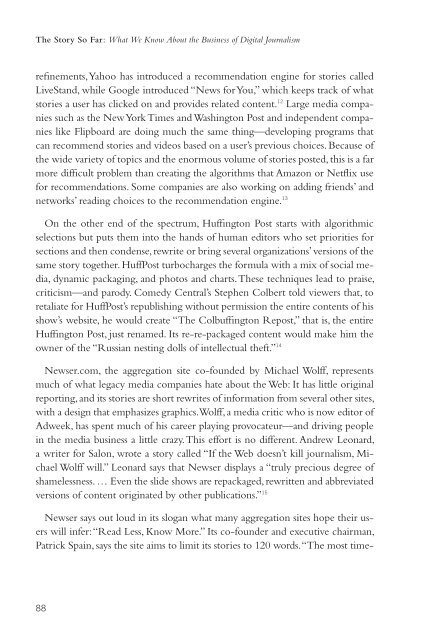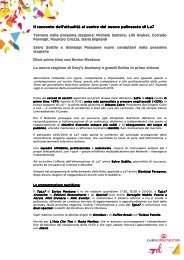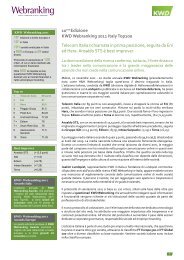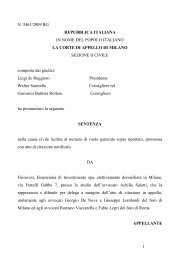What We Know About the Business of Digital Journalism
What We Know About the Business of Digital Journalism
What We Know About the Business of Digital Journalism
Create successful ePaper yourself
Turn your PDF publications into a flip-book with our unique Google optimized e-Paper software.
The Story So Far: <strong>What</strong> <strong>We</strong> <strong>Know</strong> <strong>About</strong> <strong>the</strong> <strong>Business</strong> <strong>of</strong> <strong>Digital</strong> <strong>Journalism</strong>refinements, Yahoo has introduced a recommendation engine for stories calledLiveStand, while Google introduced “News for You,” which keeps track <strong>of</strong> whatstories a user has clicked on and provides related content. 12 Large media companiessuch as <strong>the</strong> New York Times and Washington Post and independent companieslike Flipboard are doing much <strong>the</strong> same thing—developing programs thatcan recommend stories and videos based on a user’s previous choices. Because <strong>of</strong><strong>the</strong> wide variety <strong>of</strong> topics and <strong>the</strong> enormous volume <strong>of</strong> stories posted, this is a farmore difficult problem than creating <strong>the</strong> algorithms that Amazon or Netflix usefor recommendations. Some companies are also working on adding friends’ andnetworks’ reading choices to <strong>the</strong> recommendation engine. 13On <strong>the</strong> o<strong>the</strong>r end <strong>of</strong> <strong>the</strong> spectrum, Huffington Post starts with algorithmicselections but puts <strong>the</strong>m into <strong>the</strong> hands <strong>of</strong> human editors who set priorities forsections and <strong>the</strong>n condense, rewrite or bring several organizations’ versions <strong>of</strong> <strong>the</strong>same story toge<strong>the</strong>r. HuffPost turbocharges <strong>the</strong> formula with a mix <strong>of</strong> social media,dynamic packaging, and photos and charts. These techniques lead to praise,criticism—and parody. Comedy Central’s Stephen Colbert told viewers that, toretaliate for HuffPost’s republishing without permission <strong>the</strong> entire contents <strong>of</strong> hisshow’s website, he would create “The Colbuffington Repost,” that is, <strong>the</strong> entireHuffington Post, just renamed. Its re-re-packaged content would make him <strong>the</strong>owner <strong>of</strong> <strong>the</strong> “Russian nesting dolls <strong>of</strong> intellectual <strong>the</strong>ft.” 14Newser.com, <strong>the</strong> aggregation site co-founded by Michael Wolff, representsmuch <strong>of</strong> what legacy media companies hate about <strong>the</strong> <strong>We</strong>b: It has little originalreporting, and its stories are short rewrites <strong>of</strong> information from several o<strong>the</strong>r sites,with a design that emphasizes graphics. Wolff, a media critic who is now editor <strong>of</strong>Adweek, has spent much <strong>of</strong> his career playing provocateur—and driving peoplein <strong>the</strong> media business a little crazy. This effort is no different. Andrew Leonard,a writer for Salon, wrote a story called “If <strong>the</strong> <strong>We</strong>b doesn’t kill journalism, MichaelWolff will.” Leonard says that Newser displays a “truly precious degree <strong>of</strong>shamelessness. … Even <strong>the</strong> slide shows are repackaged, rewritten and abbreviatedversions <strong>of</strong> content originated by o<strong>the</strong>r publications.” 15Newser says out loud in its slogan what many aggregation sites hope <strong>the</strong>ir userswill infer: “Read Less, <strong>Know</strong> More.” Its co-founder and executive chairman,Patrick Spain, says <strong>the</strong> site aims to limit its stories to 120 words. “The most time-88
















